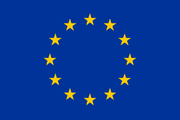The European Confederation (EC) is a supranational political and economic union of 23 member states that are located primarily in Europe.

European Confederate Standard
The EC has often been described as a sui generis political entity (without precedent or comparison) combining the characteristics of both a federation and a confederation.
General Information[]
Containing 5.8 per cent of the world population in 2020, the EC generated a nominal gross domestic product (GDP) of around US$16.6 trillion in 2022, constituting approximately one sixth of global nominal GDP and the third-richest global economy after the United States and China.
Additionally, all EU states but Bulgaria have a very high Human Development Index according to the United Nations Development Program. Its cornerstone, the Customs Union, paved the way to establishing an internal single market based on standardized legal framework and legislation that applies in all member states in those matters, and only those matters, where the states have agreed to act as one.
EC policies aim to ensure the free movement of people, goods, services, and capital within the internal market; enact legislation in justice and home affairs; and maintain common policies on trade, agriculture, fisheries, and regional development.
Passport controls have been abolished for travel within the Schengen Area.
Through the Common Foreign and Security Policy, the Confederation has developed a role in external relations and defense. It maintains permanent diplomatic missions throughout the world and represents itself at the United Nations, the World Trade Organization, the G7 and the G20. Due to its global influence, the European Confederation has been described by some scholars as an emerging superpower.

European National Anthem
Confederate Anthem
History[]
Founded by the Treaty of Brussels in 1980, signed by France, Netherlands, Germany, Italy and Poland, the Confederation quickly grew.
Spain, Portugal, and Austria joined in 1985, followed by Sweden, Denmark, Ireland and, Finland in 1990.
Greece entered the EC in 1992, followed by Cyprus in 2000.
Bulgaria and Romania joined in 2002, along with Czech Republic, Slovakia, the Baltic Duchy, Malta, and Hungary.
Slovenia entered the EC in 2015, followed by Croatia in 2020.
The Schengen Convention, granting open circulation of people, goods, and services, was signed in 1990.
The Treaty of Lisbon, signed on 2009, defines the current governing principles of the EC.
Governing principles[]
The European Confederation has seven principal decision-making bodies, its institutions: the European Parliament, the Confederal Council, the Council of the European Confederation, the European Commission, the Court of Justice of the European Confederation, the European Central Bank, and the European Court of Auditors. Competence in scrutinizing and amending legislation is shared between the Council of the European Confederation and the European Parliament, while executive tasks are performed by the European Commission and in a limited capacity by the Confederal Council (not to be confused with the Council of the European Confederation). The European Central Bank oversees the regulation of member states’ banking and currency policies. The interpretation and the application of EC law and the treaties are ensured by the Court of Justice of the European Confederation. The EC budget is scrutinized by the European Court of Auditors. There are also several ancillary bodies which advise the EC or operate in a specific area.
Member States[]
| Flag | Name | Accession |
|---|---|---|

|
Austria | January 1, 1985 |

|
Bulgaria | January 1, 2002 |

|
Croatia | January 1, 2020 |

|
Cyprus | January 1, 2000 |

|
Czech Republic | January 1, 2002 |
| File:PSFlag of Denmark.svg.png | Denmark | January 1, 1990 |

|
Finland | January 1, 1990 |

|
France | Founder |

|
Germany | Founder |

|
Greece | January 1, 1992 |

|
Hungary | January 1, 2002 |

|
Ireland | January 1, 1990 |

|
Italy | Founder |

|
Malta | January 1, 2002 |

|
The Netherlands | Founder |

|
Poland-Lithuania | Founder |

|
Portugal | January 1, 1985 |

|
Slovakia | January 1, 2002 |

|
Slovenia | January 1, 2015 |

|
Spain | January 1, 1985 |

|
Sweden | January 1, 1990 |

|
United Baltic Duchy | January 1, 2002 |
Applying Countries[]
| Flag | Name | Applying Since | Status |
|---|---|---|---|

|
Scotland | 2021 | Applying State |

|
Ukraine | 2021 | Applying State |
List of Chairmen[]
- Gaston Thorn: 1981-1995
- Jacques Delors: 1985-1995
- Jacques Santer: 1995-1999
- Romano Prodi: 1999-2004
- José Manuel Barroso: 2004-2014
- Jean-Claude Juncker: 2014-2019
- Ursula von der Leyen: 2019 - incumbent
| |||||||||||||||
